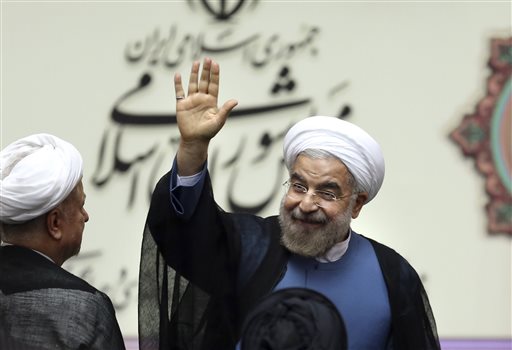UPDATE (Nov. 8): As predicted below, the Iranian regime has been able to extract more concessions from the U.S. The proposed “freeze” on Iran’s nuclear program is anything but, and could allow Iran to accelerate its program in the future more quickly than the world could re-impose sanctions. It also turns out that Obama has already quietly eased sanctions. This is a bad deal–and Benjamin Netanyahu is not shy about saying so.
***
President Barack Obama will urge Congress not to pass new sanctions against Iran in order to allow the U.S. and other western powers to offer Iran a deal: sanctions relief in exchange for a six-month suspension of its nuclear enrichment program, Ha’aretz reports. The White House takes the position that “any new sanctions on Iran at this stage would seriously undermine the negotiations,” according to an unnamed source.
There is an argument for holding off on new sanctions: eventually, you run out of them, leaving only military options. We are not nearly there yet, but we might be in the near future. If Iran is convinced that the West will not use force, it will never agree to stop enrichment. But the same might be true if Iran is convinced that the West intends to use force regardless: better to establish a nuclear deterrent before the chance is gone.
There is also an argument for reducing sanctions: if you are using a carrot-and-stick approach to urge Iran to abandon nuclear enrichment, you have to occasionally use the carrot. Iran’s recent turn towards moderation may be a farce–but if there is a small chance of real progress, it might be worth taking, and encouraging the few voices within the Iranian regime who might genuinely wish to avoid war with the U.S. (or with Israel).
But even if those are desirable steps–a very big “if”–Obama’s best approach is not to urge Congress not to pass new sanctions, but to let Congress pass sanctions and then hold back on signing them into law. Obama should maneuver himself into a position in which his hands are tied, and demonstrably so. Then he will be able to tell the Iranians that the only way he can justify a veto is if they give him something real in return.
In negotiation, this tactic is called tying your own hands. It is counterintuitive for most world leaders, who do not wish to portray themselves as weak. But, paradoxically, having no room to maneuver domestically gives leaders maximum leverage internationally. Think how much leverage Iran’s president Hassan Rouhani has solely because the world knows his bosses are so intolerant of compromise (and make that very clear).
By fighting Congress on new sanctions, Obama is giving himself more negotiating options, but less leverage. The Iranians, astute observers of American politics, look at what the administration is doing and understand that they can probably extract even more from Obama. He is, after all, effectively taking their side against a more insistent public. That’s why even this new deal is dead on arrival. Meanwhile, Israel is losing patience.

COMMENTS
Please let us know if you're having issues with commenting.